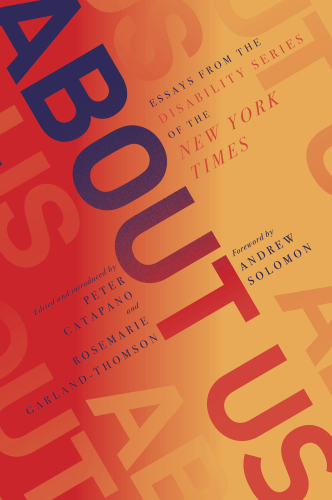
About Us
Essays from the Disability Series of the New York Times
فرمت کتاب
ebook
تاریخ انتشار
2019
نویسنده
Rosemarie Garland-Thomsonناشر
Liverightشابک
9781631495861
کتاب های مرتبط
- اطلاعات
- نقد و بررسی
- دیدگاه کاربران
نقد و بررسی

June 10, 2019
In this exquisite collection drawn from the Times essays series started in 2016, disability is, refreshingly, seen as a part of daily life, even as the contributors discuss facing a “world that does not expect us and is often not made for us.” Ona Gritz, who has right hemiplegia, a form of cerebral palsy, recalls asking a literary agent who suggested she write a memoir, “Would I have to be disabled on every page?” Coeditor Garland-Thomson, having learning her asymmetrical hands and forearms are caused by complex syndactyly, an exceptionally rare genetic condition, no longer feels like an “orphan” but part of a “world of disability pride and advocacy.” Similarly, the late Oliver Sacks finds value in his disability, an increasing loss of hearing, enjoying how “in the realm of mishearing... a biography of cancer can become a biography of Cantor (one of my favorite mathematicians)... and mere mention of Christmas Eve a command to ‘Kiss my feet!’ ” The 1990 Americans with Disabilities Act comes up often throughout, making fully clear the turning point it represented. Demonstrating, above all, the value of persistence, Catapano and Garland-Thomson’s anthology merits a spot on everyone’s reading list for its brilliant assemblage of voices and stories.

July 1, 2019
In this expansive volume, Catapano (opinion editor, New York Times) and Garland-Thomson (English, bioethics, Emory Univ.; Extraordinary Bodies) present 60 selections from the New York Times' weekly "Disability" series, in which people discuss living with disability. This collection proves disability knows no boundaries, as the pieces chosen (grouped by thematic topics such as family, love, coping, work, and joy) represent a range of ages, genders, sexualities, professions, and classes, from individuals with disabilities physical or mental or a combination of both that might have been with them since birth or occurred through chance or accident. While it upholds the value and dignity of people with disabilities, this is no easy read of purely "inspirational" tales, as frustration, worry, and anger sit beside happiness, confidence, and reflective grace. The one notable flaw may also be a strength: by eschewing any larger sociopolitical theme and focusing on individual voices, it reinforces its message of disability as a complex aspect of the individual rather than a monolithic identity. VERDICT A well-edited, thoughtful volume and a multifaceted glimpse into some of the experiences of the largest minority group in the world.--Kathleen McCallister, William & Mary Libs., Williamsburg, VA
Copyright 2019 Library Journal, LLC Used with permission.

July 1, 2019
Disabled essayists reflect on love, joy, justice, community, and navigating daily challenges. For three years, the New York Times has hosted "Disability," a weekly series of essays by and about people with disabilities. The newspaper's opinion editor Catapano (co-editor: Modern Ethics in 77 Arguments: A Stone Reader, 2016, etc.) and disabilities scholar Garland-Thomson (English and Bioethics/Emory Univ.; Extraordinary Bodies: Figuring Physical Disability in American Culture and Literature, 1997, etc.) have selected some 60 pieces from the series, amply fulfilling their aim of representing the diversity and richness of human experience. Although the contributors all have access to language, therefore representing only a partial demographic of the disabled, they discuss common issues, such as the desire for independence balanced with the need for intimacy and caring. As psychologist Andrew Solomon (who was diagnosed with depression) writes in the introduction, the book "is really in many ways about how we seek meaning in who we are rather than in who we might have wished to be." The essayists convey with uncommon candor how they live with disabilities that include blindness, deafness, panic attacks, anxiety, depression, cerebral palsy, stuttering, paralysis, and Tourette's. As Garland-Thomson notes, disability can affect anyone, suddenly and randomly: "An oncoming car in the wrong direction can transform the person we think we are today to a different one tomorrow. No other social identity category is so porous and unstable." Several writers found themselves disabled after an accident or injury; others were born with anomalies. Garland-Thomson, for example, has a rare genetic condition that resulted in her having disproportionate arm lengths and only six fingers. Living in a world built for "the fully fingered," she proved to be resourceful in "developing practical workarounds for the life demands my body did not meet." Many writers praise the Americans with Disabilities Act of 1990, which helped individuals meet their needs by requiring such adaptions as ramps, Braille materials, hearing assistance equipment, elevators, special parking places, and pedestrian curb cuts. Although several writers resist being called inspiring, their eloquent essays are nothing less. A rich, moving collection.
COPYRIGHT(2019) Kirkus Reviews, ALL RIGHTS RESERVED.

























دیدگاه کاربران